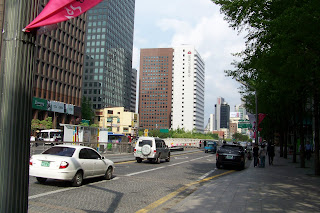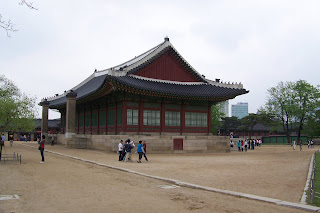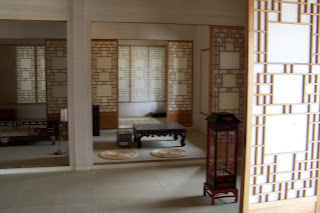Greetings from South Korea! I have been here for nearly three months and have had every intention of getting this to you sooner, but alas, here it nearing the third month and I am just writing this now. Perhaps it is better this way, now that the “romance” of living in another country is slowly fading away. The process of getting over here went quickly, more quickly than I anticipated when I left St. Louis at the end of March. It was probably only a month or two from the time I first contacted someone about this opportunity to the time I landed on the airplane in Seoul, South Korea.
So what transpired to make me move to South Korea suddenly? At one point I was working two jobs, about 55 hours a week, and even at that point I was behind on making payments. After one of those jobs did not work out, I was only working around twenty hours a week, which was certainly not enough to pay bills, which included rent and utilities. I knew I had to figure out some way to make more money so that I could not only keep up with making payments but actually make some progress in getting out of debt which I definitely was not doing during my time in St. Louis. I figured out how much money I needed to make annually and began to consider all of the people I know around the world and I remembered one of my peers from seminary whom I contacted, and the rest is history.
Leaving St. Louis was bittersweet, and even now, I feel pangs about leaving the youth especially on Virginia Avenue. The curious thing is that I probably did more “ministry” in that neighborhood where I was living during the time I prepared to leave St. Louis than I had done the whole two months previously. Granted, I was driving the church van and helping with the youth, though I had backed off on that since one of my jobs required me to work on Sundays, but that was not what I envisioned when I moved to St. Louis, as the pastoral staff so candidly reminded me in one staff meeting. So, we had a pizza party at my apartment before I left and I learned that you don’t have to have a TV, DVD player, or even all the pieces of furniture one would like to have in order to have a successful “party”. I think of the people I met in St. Louis often and hope to return there, but one of the lessons I learned is that I can’t make something happen there on my own. So I am hoping that while I am away something will ignite there and that I will be able to join the “fire” when I return.
For now, I am teaching English at Korea Nazarene University, which is about an hour-and-a-half south of Seoul, the capital of South Korea. Lest those of you who know me well are having a heart attack because you remember my writing quality or lack thereof, I am teaching conversational English, which means that the main thing I’m supposed to do is to teach students how to have conversations in English. Just as the disciples asked Jesus to teach them “to pray”, so I am teaching them to speak in English. This means that the main thing is for them to practice speaking in English, which is obviously hard to do since English is not their native tongue.
I have been amazed how badly people want to learn English, must greater than I did when I was in school. It makes me feel bad for not wanting to learn English any more than I did. And it is obvious that English is THE key to reaching people for the sake of God’s kingdom. I am still trying to figure out what the “key” might be in St. Louis and other American cities.
When I got here, my first assignments were to teach English to children on Saturdays, which also involved working with a Korean native who is also a student at the university where I teach. This activity with the children is significant because it means that the Christian university I am teaching at now has a relationship with the city in which it is located. In terms of community development, this seems like an important thing, something that is again applicable to urban ministry in the United States. I was also assigned the task of teaching administrative staff members to speak in English. Both of these have been satisfying and challenging at the same time.
If I were to sum up the attitude of the Korean people in one word, it would be this: hospitality. I don’t think it is possible to pay a Korean back because as soon as I think I have, s/he turns around and does something for me. Even if I think I have paid someone back, s/he has done much more for me beyond buying me a meal.
When I first arrived here, I could not tell much difference between the eastern and the western worlds because technology is so developed out here. There is even a McDonald’s within walking distance of the university. I have eaten there about three or four times since I have been here. I have shocked some foreigners by telling them how many times I have eaten at McDonald’s but that was mostly due to convenience. I am happy to report that there is no such thing as Wal-Mart in South Korea. I think there was a Wal-Mart presence at one point, but their competitor E-Mart apparently shut them out. Perhaps E-Mart will one day be in the United States. Of course, since I shop at E-Mart to save money, I keep wondering what their “evils” are and how that compares to Wal-Mart.
As I said, the romance of living in another country is beginning to wear off. In a Korean traditional restaurant (by the way, “Korean traditional” is a phrase one hears often in Korea) taking off one’s shoes at the door and sitting on the floor is common practice. It is also common to walk to the left of a person when meeting them on the street. Pedestrians do not have the right of way. It is not uncommon to see people drive through red lights, especially those on motor scooters who have to make deliveries. They even drive on what would be comparable in the US to a sidewalk.
I am currently involved in one church primarily, which has just started an English service. This means there are now two English services on the university campus, which raises the question in some peoples’ minds of whether or not two English services are really necessary. This is a valid question, and I think the answer is difficult because there are not many native English speakers who participate at the church I am currently involved in. The licensed minister who is leading this service is also an American and he even knows a peer of mine whom I went to Bible school with. I had the opportunity of preaching last week in the English service. I also teach a short English class at the same church after the service, which is currently studying a popular Christian book written by an American author. After that is over, I attend a Korean service at a church on the edge of campus and teach a children’s English class after having a good Korean traditional meal for lunch.
I was overconfident about my ability to use chopsticks before I moved over here. I was expecting Koreans to use wooden chopsticks like the Chinese restaurants I had been to in the US, which are round and easier to handle than Korean chopsticks which are flat metal. After having some practice and buying my own set of chopsticks, I am starting to get the hang of it. But noodles are still a challenge for me. Sometimes I lose the noodles, which makes a splash in the bowl and sometimes gets on my clothes. This sounds worse than it really is. The common dish that is present at every meal is something called, Kimchi. I have developed the practice of having it at least twice a day.
I have a cell phone in Korea, as indicated at the top of this letter, which is much cheaper than an American cell phone. The last month I paid it cost the equivalent of $27 and the months before that it was about $12-13. That’s much better than I could get away with in America. I have confused some people who called me because I answer saying, Yo-bo-se-yo, which means hello. This has confused Koreans and foreigners because they are not expecting a foreigner to answer this way.
Speaking of Korean, I am no expert by any means on this language and am trying to learn more by memorizing vocabulary and working through Korean lessons in a textbook and a workbook. I got here too late to take the Korean class, so I will probably get the joy of doing that next semester. However, I am learning a few words and phrases, like an-nyung-ho-se-yo (hello), an-nyung-hi-ka-se-yo (goodbye when staying) and an-nyung-hi-kye-so-yo (goodbye when leaving) and kam-sa-ham-ni-da (thank you). I had a lot of Koreans chuckle when I spoke these phrases in Korean because I used intonation, something Korean doesn’t utilize, so it sounded funny to them. I even had one Korean tell me yesterday that I have a North Korean accent. Could it be that I was adopted after all?
There are many more details that I probably take for granted, but hopefully this gives you some sense of what is going on in Brent Dirks’ life. When I moved to St. Louis, I didn’t know what was ahead, and I certainly didn’t think I would be moving overseas. Likewise, I don’t know what the future holds or even how long I will be here. I’m still on a quest to find out what it means to be like Jesus, and that question is even more perplexing now that I am living in another culture. I hope this letter finds you all doing well and I look forward to hearing from you soon.
Wednesday, July 2, 2008
Tuesday, July 1, 2008
Subscribe to:
Posts (Atom)
































